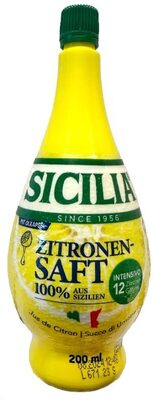Zitronensaft - Sicilia - 200ml
This product page is not complete. You can help to complete it by editing it and adding more data from the photos we have, or by taking more photos using the app for Android or iPhone/iPad. Thank you!
×
Barcode: 76106897
Common name: Zitronensaft
Quantity: 200ml
Packaging: Plastic, Pe-polyethylene, Ldpe-low-density-polyethylene, fr:Bouteille plastique
Brands: Sicilia, Migros - Sicilia, Sicilia - Sidag AG
Categories: Fruchsäfte, Fruchtgetränke, Getränke, Pflanzliche Getränke, Pflanzliche Lebensmittel und Getränke, Säfte und Nektare, Zitronensäfte
Labels, certifications, awards: Vegetarian, Vitamin C source
Origin of ingredients: Italy
Manufacturing or processing places: 8583 Sulgen, Switzerland
Link to the product page on the official site of the producer: http://www.sicilia.de
Stores: Migros
Countries where sold: Germany
Matching with your preferences
Environment
Packaging
Transportation
Report a problem
Data sources
Product added on by kiliweb
Last edit of product page on by prepperapp.
Product page also edited by benbenben, charlesnepote, ecoscore-impact-estimator, foodvisor, grumpf, inf, packbot, sebleouf, torredibabele, wyssphil-bluewin-ch, yuka.sY2b0xO6T85zoF3NwEKvlhV6f_bguQrYHjLSyEut4_DSNK2zR_BvxZKlLqs, yuka.sY2b0xO6T85zoF3NwEKvlhV7YvyCvQP2Zh_ji1K7lvKTKsXXaNpW_9ijFKs, yuka.sY2b0xO6T85zoF3NwEKvlkZhCP7VsCmeGgTQhWqPx4-FErzveIld6ZPzEao, yuka.sY2b0xO6T85zoF3NwEKvlktAeevSkA3bEAzhpEGs1vW3P5XWTf1v0rb5DKs, yuka.sY2b0xO6T85zoF3NwEKvlkxbbOHjrxjbCjDRhnaFz_nVJbrqW84r06fFH6o, yuka.sY2b0xO6T85zoF3NwEKvll1fV_znqSz2bELkl0Sq-PjXf5jsRc5fx4jqNqs, yuka.sY2b0xO6T85zoF3NwEKvlmBmDtj_jwKfPj_4o0iI_YbSC8Xif88qybPWHKs.









